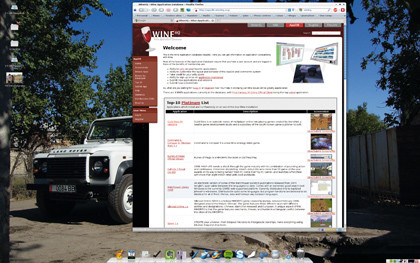Has Windows 7 killed Linux on the desktop?
Or will cloud computing give Linux another chance?

People don't just like Windows 7, it's the anti-Vista: loved for as many often spurious reasons as Vista was hated.
Many watchers and pundits, from big corporates, such as Novell to a million tuxhead blogs, saw the price and unpopularity of Vista as a golden opportunity for the Linux operating system to sneak in and steal a slice of the desktop market.
But has Window 7 seen off any threat from open source operating systems? In other words, has Windows 7 killed Linux on the desktop?
I'll come clean: I switched to Ubuntu shortly after the launch of Vista. My XP machine was being suffocated by Registry bloat and an ever-expanding set of internet security apps, and I figured that before I gave in and upgraded Windows, I'd try using Linux as a daily desktop for a while. I've never looked back, and even now only boot into Windows 7 for gaming.
I like the flexibility that Linux gives me, the fact its start-up time's never slow and its ethos of free software enough that I overlook the two disadvantages it has for me.
Now I'm a die-hard fan of Linux who'll need a really compelling reason to go back to Windows, but that puts me in the tiniest of minorities. Should people like me still be trying to convince people happy with XP or Windows 7 to switch?
Fears about Vista's hard drive footprint, the lack of driver support and suspicion of its background DRM activity meant there was an unprecedented number of reviews and articles making direct comparisons between Linux distros and Windows at the time of its launch.
Sign up for breaking news, reviews, opinion, top tech deals, and more.
Everyone from the Inquirer to the Guardian ran one, putting awareness of Linux as an alternative firmly into the mainstream. Commentators almost universally took a favourable view towards the open source OS, because the perceived step backwards in Windows' useability occurred just as Linux developers were weaning themselves off of the command lining and learning to love the GUI.
Then there was the netbook. The appearance of pint-sized portables was a second unfortunate coincidence for Microsoft. Over one in five laptops sold today is an Atom-based netbook, according to research group DisplaySearch. Yet they sprang out of nowhere at the same time as Vista launched to become the single-most important market sector during the recession.
And netbooks don't run Vista. Not only did this mean more people using Linux on their netbooks, the theory was that consumers who were introduced to it this way would be more interested in running a Linux-based OS on the desktop too.
It was a sound theory – initial claims that Linux powered netbooks had return rates four times higher than XP-based ones turned out to be largely FUD with executives at Dell and Asus going on the record to dispute it.
What's more, even though it sometimes appears as if Linux-powered netbooks have vanished from the shelves, analysts at ABI claimed that last year nearly a third of all netbooks were Windows free. A large proportion of those will be sold in the developing world, but Dell's sales figures show a surprisingly similar split between their Windows and Ubuntu netbooks. Even in the Windows-obsessed West, we love Linux on netbooks.
So why haven't we felt as favourably towards it on proper PCs? Despite all these circumstances coming together, Windows didn't just weather the perfect storm on the desktop, it rode the wave as if it was on holiday in Hawaii.
There are many ways of tracking operating system usage, some more reliable than others, but all of them suggest that Microsoft's dominance hasn't been seriously challenged in the last four years with over 93 per cent of people sticking with them.
The figures also seem to suggest that where people are switching, it's to Apple, not Linux. So in the middle of the worst recession the post-WWII world has seen, if people have abandoned Windows its to a more expensive competitor, not the free one.
The proportion of desktop, as opposed to server, computers running some flavour of Linux over the last two years has risen from roughly three quarters of one percent to around one percent. If claims for the number of netbooks running Linux are true, that easily accounts for the increase.
The numbers might make suits from Seattle sleepless, but a loss of 3 per cent market share (a chunk of which is to iPhone, not just OSX) says there's been no mass exodus away from Microsoft. Did Linux have its chance and blow it?
New? Already in Linux
Most of the new features in Windows 7 are the ones that Linux users have been gloating about for years: desktop personalisation, controls for maximising and placing open windows, a dock with preview thumbnails, more protection against unwanted programs installing in the background, less reliance on third party drivers and slicker upgrades for those you need… they've all been integral parts or simple add-ons to the Linux world for a long time.
One of the curious differences between Ubuntu 8.04 and Windows Vista, for example, was that despite being made up of lots of different programs by lots of different programming groups, Ubuntu's core functions and control panels felt more unified across all of its pre-installed apps than did Vista's, which were frankly a mess.
In Windows 7, on the other hand, the seemingly random control panel layouts are gone and the fewer clicks required to do anything feel like a welcome return to Windows 98. Far from being a victory for open source enthusiasts, though, Windows 7 has meant that there's even less reason for the technically minded to try out Linux, let alone the unwashed hordes.
On the other hand, anyone who was hoping for the downfall of Microsoft and the mass adoption of Linux because Vista was unpopular, should move away from the bong now. That was never going to happen, because most PC users are never going to change the operating system that arrived pre-installed on their PC; it's just too much of a risk.
As we saw with netbooks, when consumers do get a choice about what ships with their PC they are interested in alternatives, especially if it saves them money. But uninstalling an OS in favour of another? That's for the brave few with the knowledge and time on their hands.

STOP WHINING: WINE aims to bring windows games and software to the Linux desktop
Linux is losing ground when it comes to gaming, too. While many will sing the virtues of WINE, which allows some Windows apps to run on Linux, few new games have achieved 'Gold' status on the database of working programs lately.
It's not directly because of Windows 7, but it's not entirely unrelated: one of the biggest problems for WINE is that there's no way to run sophisticated online DRM on a non-native system. But if there are fewer obvious reasons to try out Linux now, they're are still plenty of others that are as valid as they've ever been.
In fact, the improvements in Windows 7 highlight exactly what it is that desktop Linux has always been good at.